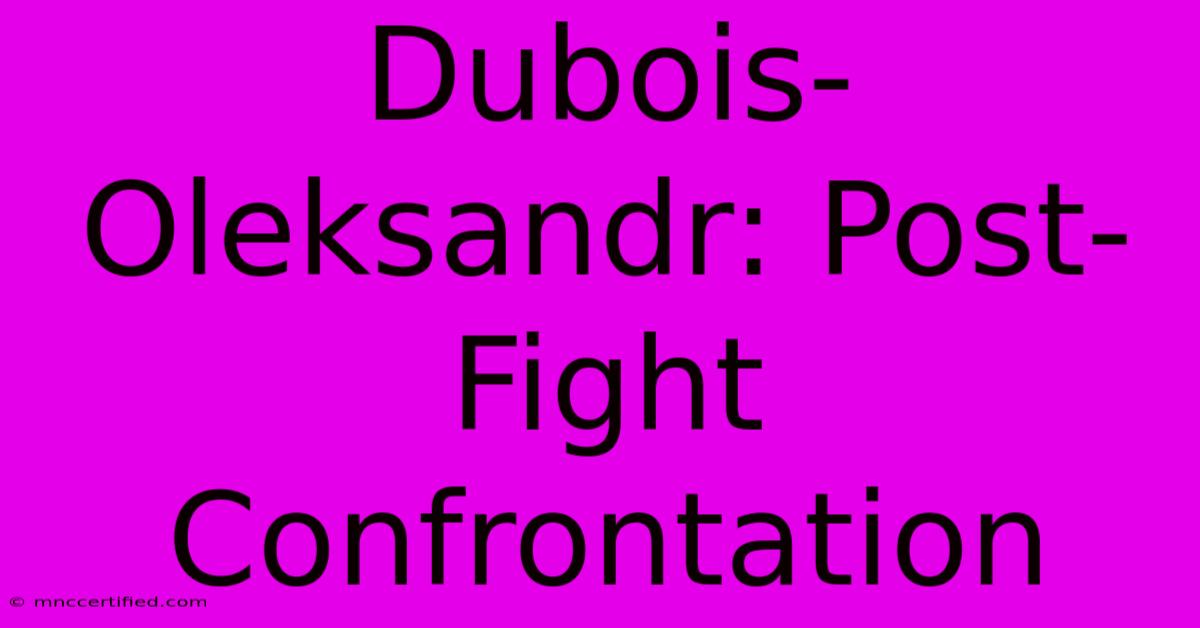Dubois-Oleksandr: Post-Fight Confrontation

Table of Contents
Dubois-Oleksandr: Post-Fight Confrontation – A Heated Conclusion
The highly anticipated heavyweight clash between Daniel Dubois and Oleksandr Usyk's mandatory challenger, Kevin Oleksandr, ended in controversy, sparking a fiery post-fight confrontation that continues to fuel debate among boxing fans and experts. This article delves into the events surrounding the fight, analyzes the controversial ending, and examines the heated aftermath.
The Fight: A Tale of Two Halves
The fight itself showcased a fascinating contrast in styles. Dubois, known for his powerful punching power, started aggressively, aiming for a knockout early. Oleksandr, showcasing his superior boxing skills and ring intelligence, skillfully avoided the early onslaught, patiently waiting for opportunities.
The turning point arrived in the fifth round with a highly debated low blow landed by Dubois. While the referee initially ruled it a foul, allowing Oleksandr a mandatory eight-count, the Ukrainian fighter visibly struggled to continue, seemingly unable to recover fully from the impact. This controversial decision formed the crux of the post-fight arguments.
The Controversy: Low Blow or Strategic Foul?
The central point of contention revolves around the legitimacy of the low blow and the referee’s handling of the situation. Many argued that the hit was intentional, a calculated tactic by Dubois to disrupt Oleksandr's rhythm and potentially exploit a vulnerability. Others maintained that it was an accidental foul, a consequence of the intense pressure and aggressive exchanges. The lack of immediate disqualification fueled outrage among Oleksandr's supporters. The debate surrounding the incident highlights the complexities of refereeing in boxing and the often subjective nature of judging fouls. This aspect generated significant online discussions and divided opinion on social media platforms like Twitter and Instagram.
The Post-Fight Aftermath: A Heated Exchange
The aftermath of the fight was anything but calm. Dubois's camp celebrated a victory by knockout, while Oleksandr’s team expressed their outrage, citing the low blow as a decisive factor in the fight's outcome. This led to a heated exchange between both teams, with accusations and counter-accusations flying. The incident transcended the boxing ring and spilled over into the public sphere.
Analyzing the Reactions: Social Media and Beyond
The controversy ignited a storm of reactions across social media platforms. Hashtags like #DuboisOleksandr, #BoxingControversy, and #LowBlowDebate trended, with fans passionately voicing their opinions. Prominent boxing personalities, analysts, and commentators also weighed in, further amplifying the debate. This significant online engagement underlines the reach and impact of this particular boxing event.
The Future Implications: What's Next?
The Dubois-Oleksandr fight and its controversial ending have significant implications for the future of heavyweight boxing. The outcome significantly impacts the rankings and potential future matchups for both fighters. The referee's handling of the low blow will likely be scrutinized and may trigger discussions on improving referee training and rule enforcement in boxing.
Looking Ahead: Repercussions and Potential Rematch
The controversy generated calls for a rematch, giving fans the opportunity to witness a fairer, more conclusive encounter. However, whether a rematch will materialize remains uncertain, dependent on the decisions of both fighters and their respective promotional teams. This uncertain future adds to the lingering interest in the saga of Dubois-Oleksandr.
Keywords: Dubois Oleksandr, Dubois Oleksandr fight, boxing controversy, low blow, boxing referee, heavyweight boxing, post-fight confrontation, boxing rematch, social media reaction, Twitter, Instagram, hashtags, #DuboisOleksandr, #BoxingControversy, #LowBlowDebate, Daniel Dubois, Kevin Oleksandr, boxing analysis.

Thank you for visiting our website wich cover about Dubois-Oleksandr: Post-Fight Confrontation. We hope the information provided has been useful to you. Feel free to contact us if you have any questions or need further assistance. See you next time and dont miss to bookmark.
Featured Posts
-
Nfl Week 16 Texans Vs Chiefs Odds
Dec 22, 2024
-
Mahomes Honest Ankle Update
Dec 22, 2024
-
Nittany Lions Playoff Bound
Dec 22, 2024
-
Chiefs Beat Texans Mahomes Tough Game
Dec 22, 2024
-
Gavin And Stacey Stars Emotional Moment
Dec 22, 2024